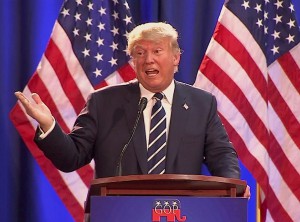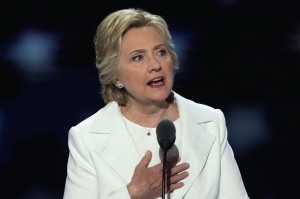
Republican nominee Donald Trump wants to rip up NAFTA and doesn't favor the Trans Pacific Partnership.
The automobile industry will face changes with the departure of the Obama administration, regardless of whether Hillary Clinton or Donald Trump emerges as the next U.S. President in November.
A Clinton presidency would be the most stable in terms of the regulatory environment for the auto industry. The most likely changes would be to the terms of NAFTA, although we would expect less drastic proposals than those from Trump, according to a new analysis from BMI Research, Fitch Group’s research arm.
The report noted that both presidential candidates elected to deliver speeches on the economy in Michigan highlighting the importance of the state, and the autos sector as its major industry, to the general election campaign.
Trump has shown mixed attitudes towards the auto sector and Michigan in particular. Speaking about the automaker bailouts in 2008 he said “the government should stand behind them 100%. You cannot lose the auto companies.” Earlier this month, however, he said the companies could have been left to go bankrupt and rebuild themselves.
Trump condemned the building of plants in Mexico, especially by Ford Motor Co., as the focal point of his speech to win over Michigan voters. He has also suggested, however, that moving production away from Michigan to cheaper states is one way to make the industry more competitive. Trump’s comments on moving jobs to the Southern United States and out of Michigan have been roundly condemned by the United Auto Workers, which, like other major unions, is supporting Hillary Clinton.

Democratic candidate Hillary Clinton has also come out against the TPP in its current form and also pledged to renegotiate NAFTA.
Trump has been particularly vocal in his opposition to carmakers setting up plants in Mexico to produce models that can be imported back to the U.S. under the North American Free Trade Agreement, suggesting he would impose a tax on these models if he becomes president and renegotiate NAFTA.
(Gas prices rising as summer driving season ends. To get details, Click Here.)
Clinton, on the other hand, has focused much more on the successes of the auto sector under Obama, particularly since the bailout, which she supported, the report noted.
The report from BMI Research said Clinton favors renegotiating certain trade deals. But she also has stated that Trump’s approach “is based on fear, not strength.” The theme of her policy is more one of ensuring other countries play fair rather than limiting trade, BMI noted.
The most likely outcome for the industry’s operating environment, regardless of who wins, is some form of change to existing trade agreements. Clinton has been less vocal in terms of a direct attack on carmakers, but she has also pledged to renegotiate NAFTA.
“If she does make changes, we believe they would be less drastic than anything proposed by Trump, ultimately providing a more stable landscape for investors,” according to the report.
(Click Here for details about the rising death toll on U.S. roads.)
The sticking point for both candidates would be getting such changes through Congress. In terms of losing jobs and investment, trade data also show that as investment in vehicle production in Mexico has grown in recent years, so has the value of the necessary component exports from the U.S. to Mexico.
“NAFTA has also allowed carmakers to increase their chances of profitability by moving production of lower margin passenger cars, which are currently not selling as well in North America, to Mexico, while locating their higher margin trucks, SUVs and performance cars in the U.S.,” the report noted.
The number of other trade agreements that Mexico has outside of NAFTA also means that American companies have the ability to target high-growth emerging markets from Mexico that might be harder or more costly to reach from the U.S., even though they are an important revenue stream for carmakers.
As part of his economic program, Trump has proposed a moratorium on all new regulations from federal agencies and pledged to repeal a host of environmental regulations introduced by the Environmental Protection Agency, which could see emissions standards and support for the development of alternative fueled vehicles impacted, although not mentioned specifically by Trump, BMI noted.
(Battle lines drawn in fuel economy showdown. For more, Click Here.)
It is also unclear whether the moratorium would include the latest regulations from the National Highway Traffic Safety Administration. “Trump’s would come at a time when the industry is looking to define the regulatory landscape around new technologies such as connected and autonomous cars,” the report noted.
